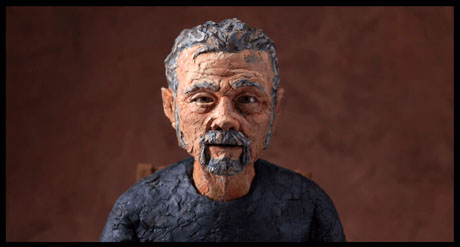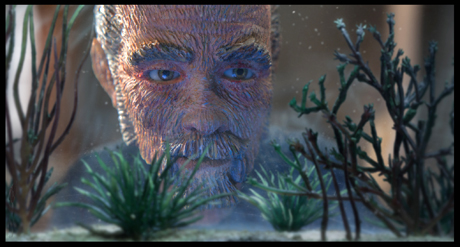
Memorable, from director Bruno Collet, is one of this year’s prime contenders for the Best Animated Short Film Oscar. It’s a powerful, complex story of an older couple dealing with the effects of dementia, paired with an artistic vision.
Jackson Murphy: How does it feel to be nominated for the Best Animated Short Film Academy Award?
Bruno Collet: I am very surprised. Neither I nor the production campaigned for this film in the United States. You have to believe that the film must be enough by itself.

JM: How have art and the art of painting inspired you throughout your career?
BC: As a child, I spent my time drawing. It also really disturbed my schooling. The arrival at the Beaux-Arts really changed my life. With the discovery of sculpture I went from 2D to 3D. My creations left the sheet of paper to be present, palpable. The discovery of cinema was the next step. I could now light my sculptures, make them move, make them speak and all that in decor and in music. What more? A story! So I started writing them. For me, cinema has proven to be a complete art.
JM: This short deals with Alzheimer’s Disease, which affects so many people. Why did you feel you wanted to take-on this subject matter?
BC: Without being personally, or in my immediate family, affected by Alzheimer’s disease, I quickly realized that its development was exponential. She seemed to choose her victims according to rules which are currently unknown to us. Whatever your social layer, your old profession, your life of excess or ascetic, this neurological degeneration can choose you and destroy your life. I had to deal with this subject, but I still had to find the angle with which I was going to do it.
JM: The bathroom scene is difficult to watch and very powerful. How was it for you making that sequence – and watching it for the first time?
BC: This sequence is inspired by a testimony from the chief operator. His father had Alzheimer’s and he tells me that he saw him talking with his reflection in the elevator mirror. It inspired the bathroom scene. Personally, as a director, I have a lot of perspective on the film, but the director of photography was [emotional].

JM: How did you incorporate your personal life experiences and memories into the story and the characters?
BC: As far as the disease is concerned, I just had to listen to listen to the caregivers’ testimony. Meetings with the sick have been rare, but I quickly realized that some of them tried to hide their illness behind a joke or a good word. This gave birth to my main character: Louis. What remains most personal, those are the choices of artists and works to illustrate the loss of memory of the main character. As a former art school graduate, it was easy enough for me to step into the shoes of a painter, even if the painter suffers from a neurodegenerative disease.
JM: “Memorable” was done in stop-motion, but also with some incredible digital effects. Can you describe this combination and how you were able to blend the two methods?
BC: It was quite complex. The difficulty was not to make the digital effects credible, but to succeed in making them compatible with stop-motion. For this, I asked people who work on computers to focus on textures, materials and not to make the movement of the virtual camera or the various elements and characters produced too fluid.
JM: During the dinner scene, the faces of the family members are much more obscure. Were they some of the more difficult to animate – as well as how the older man looks in the final sequence?
BC: The character in the final scene, which is made of latex foam on a ball-and-socket frame, did not pose any particular problems. This technique is quite usual for me. The guests’ faces are made of plasticine. Successfully animating them is much more complex. It took all the know-how of my team of animators so that the different colors that make up the faces do not mix.

JM: The music is elegant and sometimes haunting. What were your goals for the score?
BC: I wanted a maximum of two pieces for the film. One that suggested a hit from the 70s and another that would allow our two characters to waltz. Nicolas Martin, the composer managed to achieve these two pieces using the same harmonies. For me, it was important for a film as short that the viewer had the impression of knowing or recognizing the main theme. This strengthens the identification and proximity of the couple to the spectator.
JM: Even though “Memorable” is about an older couple, I feel like young people can also identify with it. What kinds of reactions have you been receiving from those who have seen the short?
BC: You are right. The film has traveled a lot around the world and has won a lot of prizes awarded by a jury of young people. I was very surprised at first. Then when I talked to them, I discovered that they were very affected by the drama of this disease. Unfortunately for them, many know Alzheimer’s disease through the sad decline experienced by their grandparents.
JM: Do you have a speech ready? What are you most looking forward to on Oscar Night?
BC: No, I haven’t planned anything, but considering how the American press talks about my film, I think I’ll start to think about it 🙂 What am I waiting for? I am already so happy to have been selected that all that can happen more will be only happiness.
“Memorable” will screen as part of the Oscar Nominated Animated Short Films presentation in select theaters nationwide starting January 29th.
- INTERVIEW: Jeff Fowler On “Knuckles” And “Sonic 3” - April 22, 2024
- INTERVIEW: “Inside Out 2” Director And Producer On Pixar Sequel - April 16, 2024
- INTERVIEW: “Puffin Rock And The New Friends” And 25 Years Of Cartoon Saloon - April 10, 2024


 January 28th, 2020
January 28th, 2020  Jackson Murphy
Jackson Murphy  Posted in
Posted in  Tags:
Tags: 






